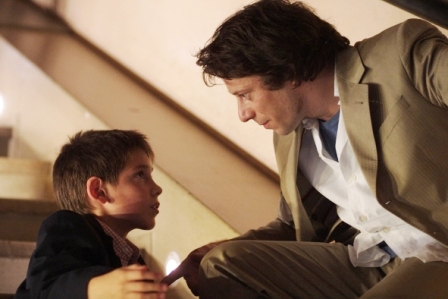
Sometimes it is hard to approach a masterpiece. How do you describe what makes it so masterpiece-y? I’ve spent some time with Arnaud Desplechin’s Kings & Queen trying to figure out how to commemorate its greatness. Watching the DVD extras really helped with this endeavor—Desplechin, adorably soft-spoken, says that he tries to put “at least five ideas” into every minute of film. His willingness to put in so many ideas, some unified, some disparate, jams every sequence in the film with an intimidating amount of detail. The quality from shot to shot is so unflagging I was reminded most of The Godfather, another family epic.
Pleasurably, the families in Kings & Queen are composed of artists rather than mobsters. The two central figures are Nora (Emmanuelle Devos), an art dealer with a 10-year-old son and her estranged, bipolar, second husband, Ismael (Mathieu Amalric), a renowned violist. As her father (who looks like a more interesting John Updike) is dying, Nora attempts to reconnect with Ismael so that he might adopt her son before her third marriage (to a man who actually seems more like a character in The Godfather). The difficulty is that Ismael has been committed to a psychiatric ward (headed by an icy Catherine Denueve) after nurses discovered him in his apartment, whose main furnishing was a noose hung above a stool.
I feel silly discussing plot matters when the true gift of this film is Desplechin’s writing—every character, no matter how minor, shines with originality and purpose. Take Ismael’s lawyer, a Hunter S. Thompson figure that, in maybe 15 minutes of screen time, betrays Ismael, steals pharmaceuticals, seduces Denueve, saves Ismael, provides sage advice and departs.

In his half of the film, Ismael reveals himself as one of the most fascinating characters in recent memory (and puts Amalric near the top of my best living actor list). All of the large and small details of his life are captivating. He is a wreck—he’s kicked out of his quartet, his own sister is filled with contempt for him, he bails out on women as fast as possible (claiming they have no souls). But then. He is a jaw-dropping as a break dancer in the hospital’s music therapy room. He makes every person he meets laugh in one way or another. He gives is sort-of-son a moving, ten minute lecture on the nature of parents and life. On a smaller scale, he gives his sister a blank Christmas card folded in quarters in August. He plays an invisible violin for a fellow inmate who’s feeling sorry for herself (this is especially funny because he is without his viola for most of the film). He gently neatens a pile of corn flakes that have been spread all over the floor during a shootout at his father’s grocery (yes, there is even a grocery store shootout in this film). He sometimes wears a musketeer doublet in public. For all these idiosyncrasies, you know Ismael, you are infuriated by his childishness, you are shocked at his generosity, you are, yes, moved by his humanity.

And Nora might be better! Devos’ role is more difficult—she has to play off of not only Ismael but her deceased first husband (the father of her child), her third husband, her business manager, her wayward sister, her son and, crucially, her father. She is the Queen. She barely sleeps for the whole film and when she does she is exhausted by the ghosts that visit her. She, consciously or unconsciously, makes the same arms-out albatross gesture that she did as a kid, posing for a picture with her sister. She talks to her son like he's another of her lovers. She reads Dickinson.

I can recall only a few scenes in cinema that are truly breath-taking and one is in Kings & Queen, when Nora reads a letter from her father after he's died. Not only do we hear his voice, we get a grainy, low-contrast documentary-style shot of him reciting its contents into our ears. It is shocking and wonderful because we think they have a good relationship (the film opens with Nora giving him a rare print of Leda and the Swan) but quickly find out otherwise. A few excerpts: "Your egoism has been monstrous...I burn with anger...you're delighted because pride makes you weak...I fear you, I hate you...I find it unfair that I should die while you live..." It's a poisonous bouquet of daggers--my hair stood on end. I felt relief when the scene flickered out because the image and voice had become my father's, the rage something incomprehensible and familiar.

It's a sequence so good it restores your faith in the art.
I also applaud Desplechin's willingness to make a literary film. In the DVD interview, he talks about how he wanted Kings & Queen to join the pantheon of stories where a powerful woman picks from an array of suitors. On screen, he is able to blend the opposing genres of melodrama and burlesque into a cohesive whole--it doesn't seem overly experimental thanks to his skill as a director. Many times, a cut from the hyperactive Ismael leads to a still Nora, giving the production a sense of balance. The camera is a benevolent, omniscient narrator allowing all characters their space.
So Kings & Queen is there in the 00’s film pantheon, rubbing shoulders with No Country for Old Men, 2046, Lost in Translation...and, of course, Redbelt.


No comments:
Post a Comment